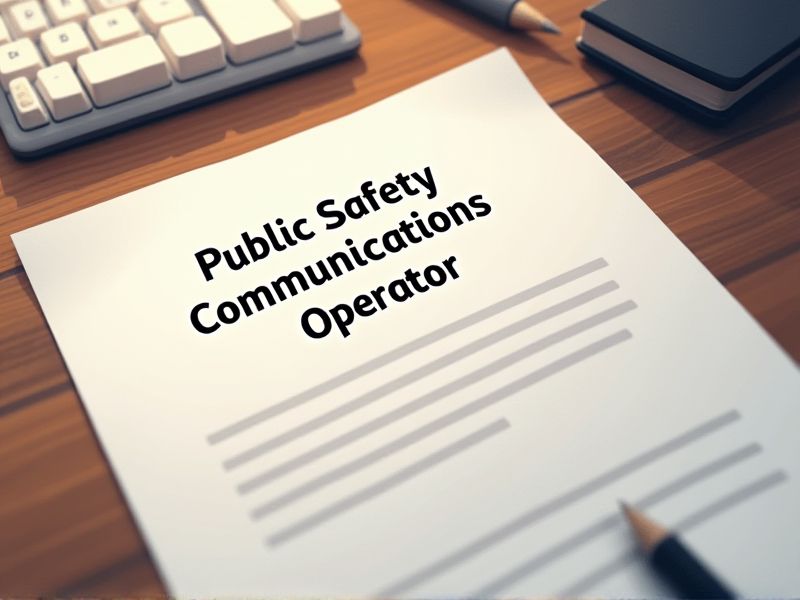
Public Safety Communications Operators play a crucial role in facilitating emergency response services. They require specific certifications to ensure they possess the knowledge and skills needed to handle high-pressure situations adeptly. These certifications validate their proficiency in effective communication, crisis management, and technology utilization. Here are some critical certifications you may need for a Public Safety Communications Operator.
APCO Emergency Telecommunicator Certification
The APCO Emergency Telecommunicator Certification ensures that Public Safety Communications Operators have standardized training, which leads to more consistent and efficient emergency response. Certification provides operators with critical skills in emergency management and communication protocols, increasing their ability to handle high-pressure situations effectively. Training associated with this certification reduces errors and improves decision-making during emergencies, which can significantly impact public safety outcomes. Operators with this certification are better equipped to coordinate with other emergency personnel, fostering teamwork and enhancing overall response coordination.
APCO Public Safety Communications Operator Certification
Obtaining the APCO Public Safety Communications Operator Certification equips operators with standardized skills essential for handling emergency situations efficiently. Certification ensures that operators are well-versed in the latest communication technologies and protocols, enhancing the overall reliability of public safety responses. It provides a framework for consistent training, reducing errors and miscommunication during critical incidents. Certification also boosts the credibility of operators, giving the public greater confidence in emergency services.
National Public Safety Telecommunicator Certification
The National Public Safety Telecommunicator Certification ensures that operators have standardized training, enhancing their ability to respond effectively to emergencies. This certification helps reduce errors in communication, which can lead to faster and more accurate dispatch of resources. It also provides operators with continuing education opportunities, ensuring they remain knowledgeable about evolving technologies and protocols. Having certified operators can improve public trust in emergency response systems, leading to better community relations and cooperation.
National Incident Management System (NIMS) Certification
NIMS Certification ensures that Public Safety Communications Operators are equipped with a standardized set of protocols that enhance coordination during emergencies. By adhering to a unified system, operators can effectively communicate and collaborate across various agencies, minimizing confusion and resource overlap. It provides a framework that supports consistency in response activities, leading to quicker and more efficient resolution of incidents. Certification demonstrates an operator's proficiency in managing complex situations, ultimately leading to improved public safety outcomes.
Computer-Aided Dispatch (CAD) Systems Operator Certification
Obtaining Computer-Aided Dispatch (CAD) Systems Operator Certification ensures Public Safety Communications Operators are proficient in handling complex emergency systems, which enhances response efficiency. Certification provides operators with crucial skills to manage real-time data accurately, reducing the potential for human error during critical incidents. Familiarity with CAD systems through certification allows operators to relay critical information swiftly to first responders, improving overall situational awareness. Certified operators can contribute to standardized practices, fostering interoperability across different public safety agencies.
FCC General Radio Operator License
The FCC General Radio Operator License is required for a Public Safety Communications Operator because it ensures the operator has the technical knowledge to manage radio transmissions effectively. Proper licensing minimizes the risk of communication errors during critical public safety operations. Regulations mandate that operators handling certain radio frequencies be licensed to prevent interference. Such licensing is vital for maintaining reliable and uninterrupted emergency communication networks.
Crisis Intervention Certification
Crisis Intervention Certification equips Public Safety Communications Operators with critical skills to effectively manage high-stress situations, leading to a reduction in incidents escalating beyond control. Certification enhances an operator's ability to identify and de-escalate mental health crises, ensuring that responders provide appropriate and timely aid. Trained operators reduce the risk of miscommunication, which often results in improved outcomes for both first responders and those in distress. Agencies often experience increased public trust and community relations when operators possess specialized crisis intervention training.
Emergency Medical Dispatcher (EMD) Certification
Emergency Medical Dispatcher (EMD) Certification ensures that Public Safety Communications Operators have standardized protocols to effectively manage medical emergencies. Proper certification equips operators with the skills to prioritize calls, providing critical instructions before first responders arrive. Certified operators can relay precise information, reducing response times and improving patient outcomes. Training enhances communication skills under pressure, increasing operational efficiency in emergency situations.
CPR/First Aid Certification
CPR/First Aid Certification ensures that a Public Safety Communications Operator has the fundamental skills to guide callers through medical emergencies effectively. It instills confidence in dispatchers to provide critical instruction during lifesaving situations, such as cardiac arrest or choking incidents. Understanding these protocols directly impacts survival rates as operators can facilitate timely and accurate assistance. Comprehensive training supports operators in making swift, informed decisions crucial to emergency response success.
APCO Public Safety Telecommunications Fundamentals Certification
The APCO Public Safety Telecommunications Fundamentals Certification is crucial because it standardizes training for operators to handle emergencies effectively. Certification ensures that operators possess essential skills to manage high-pressure situations, thereby reducing response times and improving outcomes. The certification also promotes uniformity in communication protocols, which enhances coordination between multiple agencies. An increase in public trust in emergency services is often seen when operators are certified, as it reflects a commitment to professional development and competence.
Summary
You gain enhanced skills and professionalism when a Public Safety Communications Operator obtains certifications. This results in improved response times and more efficient handling of emergency situations. Certified operators tend to make fewer errors, leading to increased public trust. Reduced operational risks and increased job satisfaction can be expected, benefiting the entire emergency response system.
